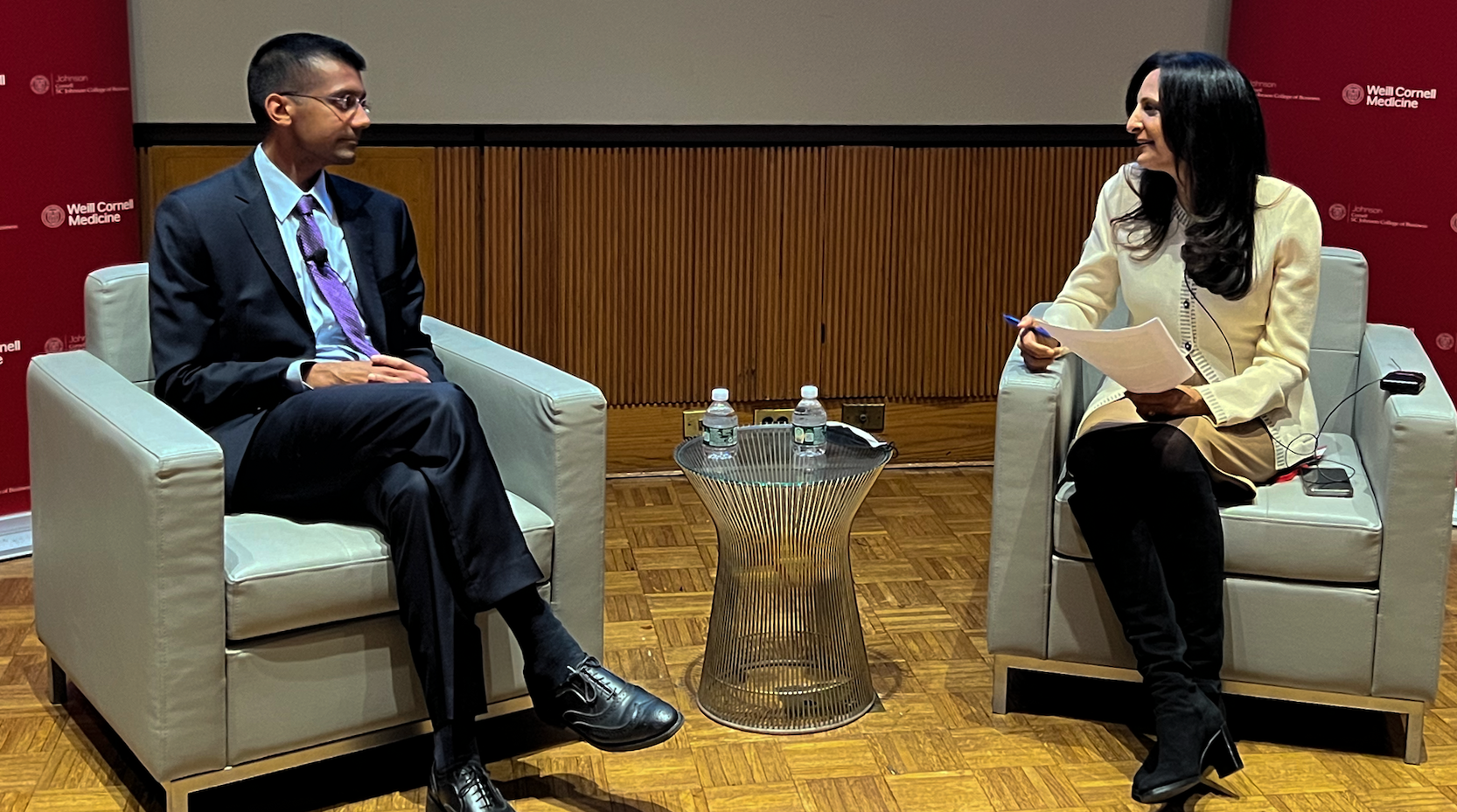
In August 2020, four months after the first confirmed COVID-19 case in New York State, Dr. Dave A. Chokshi was appointed as the 43rd Health Commissioner of the City of New York. A primary care physician and public health expert who had served the state of Louisiana during Hurricane Katrina and on the FEMA delegation for Superstorm Sandy, he became a pivotal figure in the city’s response to the pandemic.
Reflecting on his unique experience during one of the largest health emergencies in recent history, Dr. Chokshi shared his perspective with Weill Cornell Medicine faculty, staff, and students at the 2022 Luminaries in Healthcare Leadership event. In a fireside chat with Dr. Rainu Kaushal, senior associate dean for clinical research and chair of population health sciences, he highlighted several key lessons learned.
Dr. Chokshi was often challenged with difficult decisions in the face of uncertainty. He noted the importance of focusing on one’s core values in these situations: “When I first took the helm at the health department, I was very forthright about my individual core values – truth, justice, and kindness,” he shared. “For the agency, I named science, equity, and compassion as our core values.” Likening values to magnets exerting powerful, but often unseen, forces, he underlined their significance in the most challenging moments. “They became important touchstones in any conversation where we knew there was a difficult decision at hand and we didn’t have all the information we needed to make it.”
Additionally, Dr. Chokshi noted, “If you believe in the scientific underpinnings of good decision-making, but you don’t actually have the data at the moment that you are making the decision, you have to recognize you might be wrong. And it’s important to convey that and revisit so you aren’t stuck on the path that you are on.” Dr. Chokshi described navigating school and economic reopenings that required this type of calibration, as well as constant communication with the public.
Another challenge Dr. Chokshi faced was balancing between health policy and individual interests. Recognizing the importance of the layperson’s perception of public health, he ensured the language he used spoke to protections rather than restrictions. “Public health is about doing tangible things for people in a way that they can feel,” he said. The historic vaccination campaign in New York City did just that. New York City was one of the first jurisdictions in the nation to offer at-home vaccinations for anyone who wanted one. By the summer of 2021, the city also issued a $100 incentive. “The foundation of our vaccination campaign was equitable access, then layering on very robust public health measures, incentives, and ultimately mandates,” said Dr. Chokshi. “Because of our policy approaches, we were able to save approximately 50,000 lives of our fellow New Yorkers.”
The COVID-19 pandemic proved to be a wake-up call for public health preparedness. Emphasizing the need for a significant investment in public health, Dr. Chokshi believes there is still a lot of work to do on the national level. “There is a false dichotomy that we have to challenge characterized as public health versus the economy rather than public health enabling the economy in a way we often take for granted.” The U.S. life expectancy has not rebounded since 2020. While not a perfect health indicator, it is powerful and encapsulates many pain points in the health system. “The decline in life expectancy was antecedent to COVID-19,” stated Dr. Chokshi. “Compared to peer high-income countries, we’ve been diverging since about 1980.” The decline is also concentrated among Black, Hispanic, and Native American communities. “We have to take all of these things together when we try to understand and redress what we are seeing with respect to the intersection of health economics and racial inequity.”
As the world begins to rebuild and recover, many still struggle to process the trauma from the past years, not only from the virus itself but the reverberating effects on our mental health. In a society that has grown increasingly fragmented, Dr. Chokshi recognizes the struggles individuals face trying to metabolize and contend with the drastic changes. On the institutional level, he offers the following advice: “The starting point for us is to ask the question of how can we take this disconnection and move toward a greater connection in the institutions that we are directly involved in. A lot of that does not have to do with starting a new initiative but with thinking about how our existing policies and how we've organized our institutions perpetuate the existing harms. Certainly that is true when we think about racial justice.” On the individual level, Dr. Chokshi recommends seeking out deeper connections, which may look different for different people. "For me, it means reconnecting with my family. After the most intense professional experience of my lifetime, I'm grateful that my daughter recognizes me again, and I get to drop her off at pre-K. It's about being conscious about trying to build connection in a way that mitigates against all of the ways in which our attention and our relationships are being balkanized in today's environment."
About Luminaries in Healthcare Leadership
Luminaries in Healthcare Leadership series is sponsored by the Executive MBA/MS in Healthcare Leadership program at Cornell University. A collaboration between the Samuel Curtis Johnson Graduate School of Management and the Weill Cornell Graduate School of Medical Sciences, this dual-degree program helps healthcare leaders develop and strengthen their business skills and management capabilities while deepening their understanding of key drivers in the industry.
- Highlights

